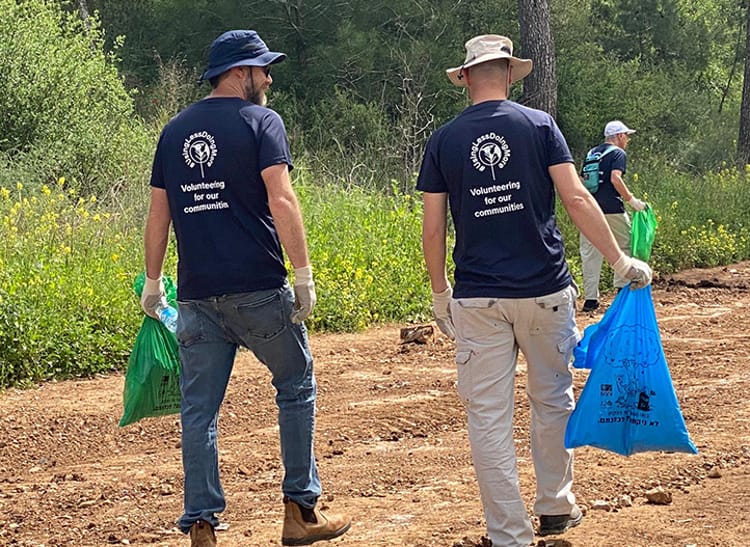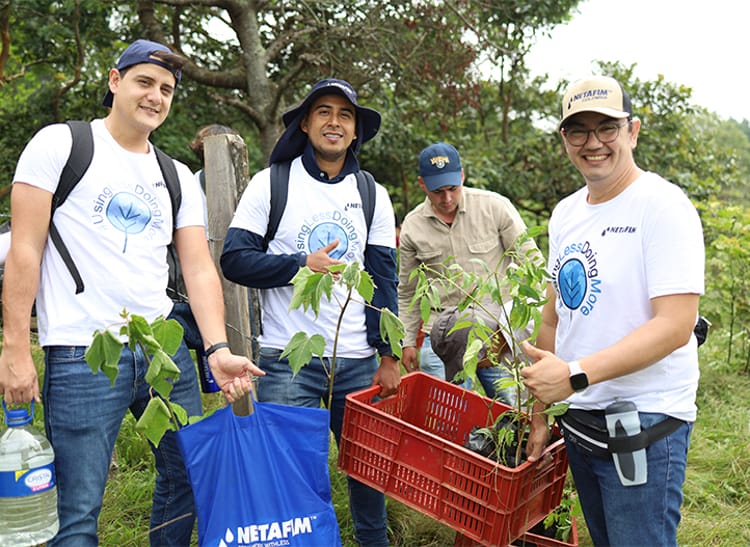Are we ready to give up on 36 million better citizens?
At the turn of the millennium, as a fresh college grad with sparkly eyes and a passion to make an impact on the world, I joined a social NGO that initiated and operated learning centers for children from low income families. My mission was to recruit the business sector to take an active part in volunteering for this cause. The search for companies who would want to involve their employees in long term corporate volunteering was a frustrating journey filled with lots of “No, thank you!” as companies for the most part were interested in a quick and immediate route to doing good and making their employees feel good about themselves. My personal journey to meaningful, impactful, and lasting corporate social responsibility had begun.
“An estimated 90 percent of companies on the S&P 500 index published a CSR report in 2019, compared to just 20 percent in 2011.״
(Governance & Accountability Institute, Inc.)
Corporate responsibility really began as philanthropy. Back in the day, the driving force behind doing good was monetary contributions by wealthy families. At the turn of the 20th century, the business sector began to see the value of being associated with philanthropy (and mingling with the wealthy individuals of the world over a glass of wine) and started to make monetary contributions to a variety of causes. Yet, philanthropic activity in its original form ran parallel to business activity with the two universes never crossing each other. Companies could pollute natural resources and engage in child labor during the daytime and in the evening raise millions to fight cancer.
Corporate responsibility evolved in the 1970s in the United States when companies began to realize that they should include social and environmental considerations as part of their business plan. At that point, businesses began to shift their operating mode from “One Bottom Line” (profit) to “Triple Bottom Line,” a term which consists of three elements: profit, people, and planet, and asserts that a company should be managed in a way that not only makes money but which also improves people's lives and the well-being of the planet.
This was the birth of corporate social responsibility (CSR), which refers to initiatives companies take to assess their effect on the environment and impact on social welfare.
“Seventy-seven percent of consumers are motivated to purchase from companies committed to making the world a better place.״
(2019 Aflac CSR survey)
Most people who were around in the early 1990s remember the student boycotts against one giant footwear company that was shamed in public for its poor labor practices and child sweatshops. The accusation spiked public outrage, protests, unrelenting criticism and eventually slowed down sales and led to layoffs. In 1998, the company CEO acknowledged, “our product has become synonymous with slave wages, forced overtime, and arbitrary abuse. I truly believe the American consumer doesn’t want to buy products made under abusive conditions.”
With the internet, social media, and access to information 24/7 consumers started voting with their dollars and choosing brands that align with their values. This increased consumer awareness has led to more businesses embracing, adhering to and implementing CSR practices. But, consumers were not the only ones taking a stand.

“55 percent of employees would choose to work for a socially responsible company, even if the salary is less.”
(The Porter Novelli report)
At the turn of the century, employees also began to realize that business shouldn’t be just about making profits. In fact, today, nearly nine out of ten employees believe it is no longer acceptable for companies to just make money; companies must positively impact society as well. The understanding that employees seek to be involved and make a difference led to the development of CSR to include corporate volunteering. Companies began to see the tremendous benefits in enabling employee volunteering in their communities.
“People who volunteer feel better physically, mentally and emotionally.״
(The UnitedHealth Group)
Employee volunteering turned out to be a real ‘win-win’. Those who are given the opportunity to volunteer are more loyal to their companies, as they have greater productivity and job satisfaction. Research from Cone Communications demonstrates the significance of corporate responsibility in people deciding which job to take. Other available research shows “clear indicators of a link” between employee volunteering programs and improved recruiting and retention. And the list of benefits goes on and on: a Deloitte survey claims that volunteering improves employees’ leadership, communication, collaboration and teamwork and creative thinking skills.
Realizing that volunteering policies can improve the quality of life for employees and people in the community, while adding value to the company, companies began to form a variety of volunteering programs; beach cleaning, food distribution, teaching youth, cleaning shelters, helping the elderly…you name it. For a few good years, corporate social media channels and PR were plastered with pictures of smiling employees dressed in coveralls, holding brushes in their hands. In community centers the joke was that some of the rooms that were painted got smaller after so many layers of colors splashed on the walls by so many volunteering initiatives.
Climate action takes the front seat.
In recent years, the intensifying climate crisis has trumped all else. Companies’ CSR agenda shifted to environmental initiatives. Social agenda and employee volunteering were somewhat relegated to the sidelines.
If ten years ago corporate responsibility was all about volunteering and painting community centers, it seems that nowadays, companies’ initiatives are all about recycling and lowering their carbon footprint.
This, in my opinion, is quite unfortunate. Lowering their carbon footprint is super important, but so is employee volunteering. Corporate employees have enormous power, and instead of pushing them aside, we need to mobilize them to achieve these huge environmental goals through day to day activities and initiatives.

Environmental or Social Considerations?
The ESG principles (Environmental, Social, Governance) usually put environmental considerations first, many times at the expense of social considerations. But the reality is that E (environmental) and S (social) considerations are deeply interconnected. Environmental challenges and the intensifying climate crisis are already playing a significant role in deepening the fractures of social inequality around the world.
The general public doesn’t have the tools to handle the climate crisis’ doomsday forecast. As employees of a corporation, it is our responsibility to find ways to empower the public (often too scared, or paralyzed or indifferent) to take action to drive environmental change. At the same time, we need to support communities that are more vulnerable to climate change.
Netafim has always been committed to the environmental issue and was built on the ground that we have to use our precious resources (water and land) more efficiently in order to guarantee our food security. And yet, just like the rest of the business sector, we are struggling with tremendous environmental challenges; production processes, efficient energy use, plastic recycling, models for circular economy, and more.
Faced with all these challenges and requirements, it would have been quite easy to make the mistake of stashing away years of community volunteering. After all, what's the value of one day of employee volunteering in their community against the deployment of renewable energy in 18 global plants?
Yet we chose differently. At Netafim, we believe that the right volunteering activities (probably not another wall painting) can enhance the sense of environmental responsibility among our employees, our ecosystems, their families, and communities. If environmental targets involve energy efficiency, while neglecting our commitment to our employees and the communities around us, any energy saved is energy wasted.
We realized that alongside our environmental agenda, we want to increase our employees' awareness of the pressing environmental issues and to turn this awareness into action that addresses our global climate crisis.

A “Glocalized” Approach to Social Corporate Responsibility
A good example of such a project is the global #UsingLessDoingMore activity we initiated in Netafim around Earth Day last year. The concept was simple; If we want to help our planet and mitigate the impact of climate change, we can’t sit idly and wait. We all have a responsibility to act. We asked people to take a small action to reduce their carbon footprint and post it on our social network, Netafim then multiplied their impact by planting a tree in each person’s name. Organized and responsible tree planting is one of the most meaningful tools to clean the air by binding CO2 and exhaust gas particles.
In the following year, we linked the activity to the UN Sustainable Development Goals. We initiated a full month of corporate volunteering all over the world asking our employees to select 4 of 17 UN Sustainable Development Goals and work to promote them through volunteering activities within their communities.
These projects mobilized thousands of people to not only acknowledge, but act in the face of a challenging environmental reality. Globally, we saw people with disabilities working hand in hand with Netafim volunteers to build community gardens, others engaged in recycling activities with women prisoners in Turkey. In Columbia, volunteers established a vegetable garden to strengthen the economic independence and nutritional security of women, while in India, volunteers cleaned rivers. All around the world Netafim employees taught children about sustainability and planted trees in Japan, Brazil and the U.S.
Our employees gained knowledge, and experienced the impact of their activities. The community benefited from these projects. Social and environmental considerations benefited from each other.
Don't Throw the Baby out with the Bathwater
As someone who's been around the CSR block for the past 25 years, I know well that corporate volunteering had its faults and many times it was just about the “social media effect” of smiling people holding paint brushes. And yet, if we get rid of employee volunteering altogether, we’re giving up on the opportunity to help 36 million people (that’s the global corporate workforce) contribute to their communities, improve their own well being and be better citizens of the world.
Are we ready to do that?
Happy International Volunteer Day - let's keep on creating an impact.

